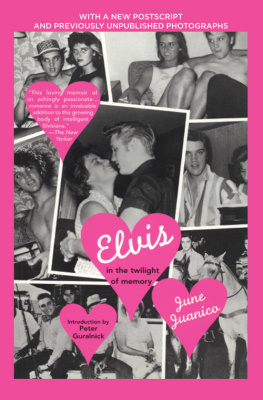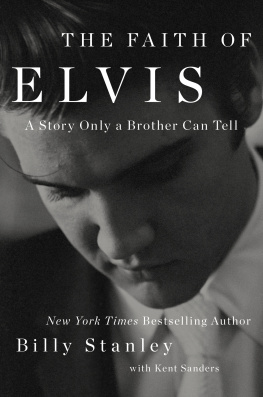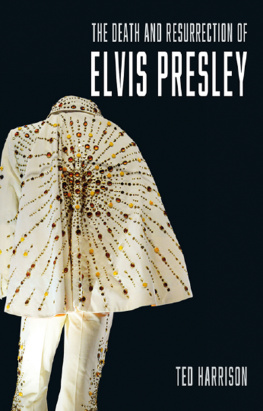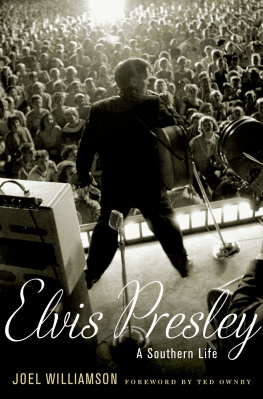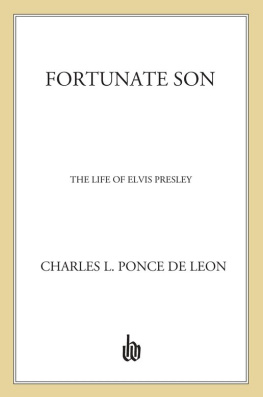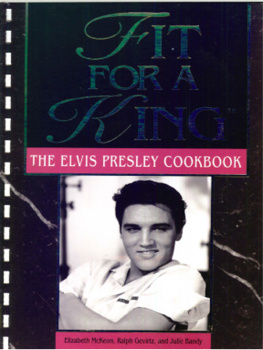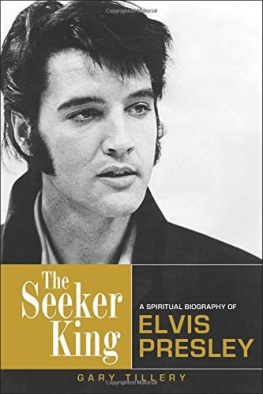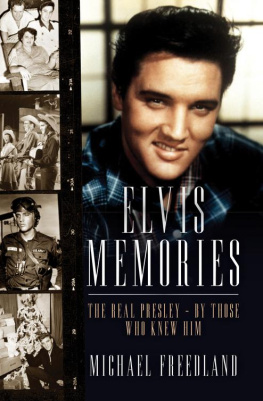Copyright 1997, 2011 by June Juanico Taranto
Introduction copyright 1997, 2011 by Peter Guralnick
Postscript copyright 2007, 2011 by June Juanico Taranto
All Rights Reserved. No part of this book may be reproduced in any manner without the express written consent of the publisher, except in the case of brief excerpts in critical reviews or articles. All inquiries should be addressed to Arcade Publishing, 307 West 36th Street, 11th Floor, New York, NY 10018.
Arcade Publishing books may be purchased in bulk at special discounts for sales promotion, corporate gifts, fundraising, or educational purposes. Special editions can also be created to specifications. For details, contact the Special Sales Department, Arcade Publishing, 307 West 36th Street, 11th Floor, New York, NY 10018 or .
Arcade Publishing is a registered trademark of Skyhorse Publishing, Inc., a Delaware corporation.
Song Lyrics Credits
Blue Suede Shoes (Carl Lee Perkins) copyright 1956 by HiLo Music, Inc.
Love Me Tender (Elvis Presley and Vera Matson) copyright 1956 by Elvis Presley Music. Copyright renewed and assigned to Elvis Presley Music (administered by R&H Music). International copyright secured. All rights reserved.
Good Rockin Tonight (Roy Brown) copyright 1948 (Renewed) by Trio Music Co., Inc. & Fort Knox Music. All rights reserved.
Unchained Melody (North/Zaret) copyright 1955 by Frank Music Corp.
Are You Lonesome Tonight? (Turk/Handman) copyright by Bourne Music Co.
Is It So Strange? (Faron Young) copyright by Faron Young Music.
Let the Rest of the World Go By (Ernest Ball and J. Brennan).
Visit our website at www.arcadepub.com.
10 9 8 7 6 5 4 3 2 1
Library of Congress CataloginginPublication Data is available on file.
ISBN: 978-1-61145-416-1
This book is dedicated to Elvis Jans everywhere,
and to Gladys Love Presley, the greatest Jan he ever had
If in the twilight of memory
we should meet once more,
we shall speak again together
and you shall sing me a deeper song.
The Prophet, Kahltt Gibran
TABLE OF CONTENTS
Photographs follow pages 746 and 258
Introduction
T HERE HAVE BEEN LOTS OF BOOKS written about Elvis Presley, of course, with probably as many personal memoirs among them as have attached to any other cultural figure or entertainer in history. Some have been spurious, a number seem to have been written out of little more than personal rancor, motivation has ranged from love to money to selfadumbration (never has one man had so many chief advisers). Virtually none have actually been put together by their narrators.
That is one of the things that makes June Juanicos book different. It is not simply that she has written a book that is filled with feeling and insight, that conveys an experience with truth and without rancor, about a real, notmythic Elvis Presley. She has also written (and rewritten) every word herself and in the process produced an account that is as touching in its unadorned honesty as it is refreshing in its feisty and unselfcensored voice.
I should have known that June was a writer when we first met. It wasnt the fact that she had saved up her experience over the years, avoiding interviews for the most part and keeping her memories to herself. Nor was it the confidence with which she told her story. Lots of people can recite anecdotes with assurance and humor. No, it was the extent to which she had reflected upon her experience, fleshed out her story with threedimensional portraits, created a narrative persona removed from the nineteenyearold girl at its center, provided a structure which, far from distorting the experience, defined it. When she produced the manuscript that she had been working on, I really should not have been surprised.
Everyone has his or her own way of telling a story, and most of us, when recounting our own experience, paint a truthful picture. It is not necessarily a complex one, though. For reasons of convenience most of our stories boil down to anecdotes, in which our own roles may be enhanced, the punch line delivered more crisply, the world more a like world (a world in which these things could have happened, these verbal ripostes could have been made) than the real one, in which motivation is often confused, people are necessarily a combination of contradictory elements, the picture is not postcardperfect.
Its hard to scrutinize these accounts realistically particularly if one is a participant in the story. It can be painful to look too closely at ones own past. But that is what June has done. Without for a moment sacrificing the immediacy of what can only be called a love story, the narrator has told a tale filled with autumnal regret, a bittersweet account filled with vivid detail that portrays a particular time and place (Biloxi, Mississippi, the summer of 1956), and carries with it its own charm and its own truth. It also captures a twentyoneyearold Elvis Presley with Hound Dog just about to start climbing the charts, on the brink of movie stardom (he receives his copy of a script titled The Reno Brothers, soon to become Love Me Tender, while he and June are in Miami), enjoying a brief moment out of the spotlight just before the curtain of privacy is forever lifted. June Juanicos book carries conviction in its very simplicity but dont be misled by that simplicity. Theres a writer there, too. And we are getting the benefit not just of her experiences but of her insights as well.
P ETER G URALNICK
Prologue
I WAS A TWOHOUR DRIVE FROM BILOXI to the station in New Orleans where Elvis would be changing trains. Because of his phobia about flying, he chose instead the long train ride from California to Memphis. Being on the train for days at a time didnt bother Elvis. It gave him time to relax and collect his thoughts. He had selected a route slightly out of his way, because it would be convenient for me to rendezvous with him in New Orleans. He had no idea, however, that I would be making the trip to say goodbye.
In October 1956 hed held me in his arms and said that he couldnt live without me, that he wanted me to stay with him forever. Now its March 1957, and he sends me a telegram, asking me to meet him at Union Station, as if nothing has changed. Maybe things hadnt changed for him; his life was moving at lightning speed. But my days and nights seemed to last forever. In the past five months he had called me only three times.
After reading about his latest houseguest, a Las Vegas showgirl, I decided it was time I too started dating again. I wasnt trying to forget about Elvis, I was just tired of staying home and being faithful. It wasnt long before I was reading about another new friend, a different Las Vegas showgirl, and that she was spending the Christmas holidays with Elvis and his family in Memphis. This was the last straw, as they say, I decided to make Elvis Presley a memory.
I began dating Fabian Taranto, a local businessman ten years my senior. Fabian had recently freed himself from a bad marriage that had lasted less than two years. Bearing a striking resemblance to a young Clark Gable without the big ears he was very handsome with his black hair and blue eyes. He was also the perfect date, literally sweeping me off my feet. My thoughts of Elvis soon began to fade away. Id made it through the hurt, and my broken heart was slowly mending. I no longer cared how many showgirls Elvis brought home for Christmas, or at any other time. I stopped reading articles about him, and listened to records instead of the radio (Elvis was on every station). I refused to talk about him to anyone, especially persistent reporters. My mother was answering the phone by saying Sorry, Junes not here, and I have nothing to say. I stopped reading all the fan mail; it piled up for months. If youre in love really in love you pick up the phone and call. Elvis had left me on hold for too long. Even in a Continental Mark 2, I could never take a backseat to anyone. If I couldnt be right up there by the hood ornament, then I didnt need the ride.

